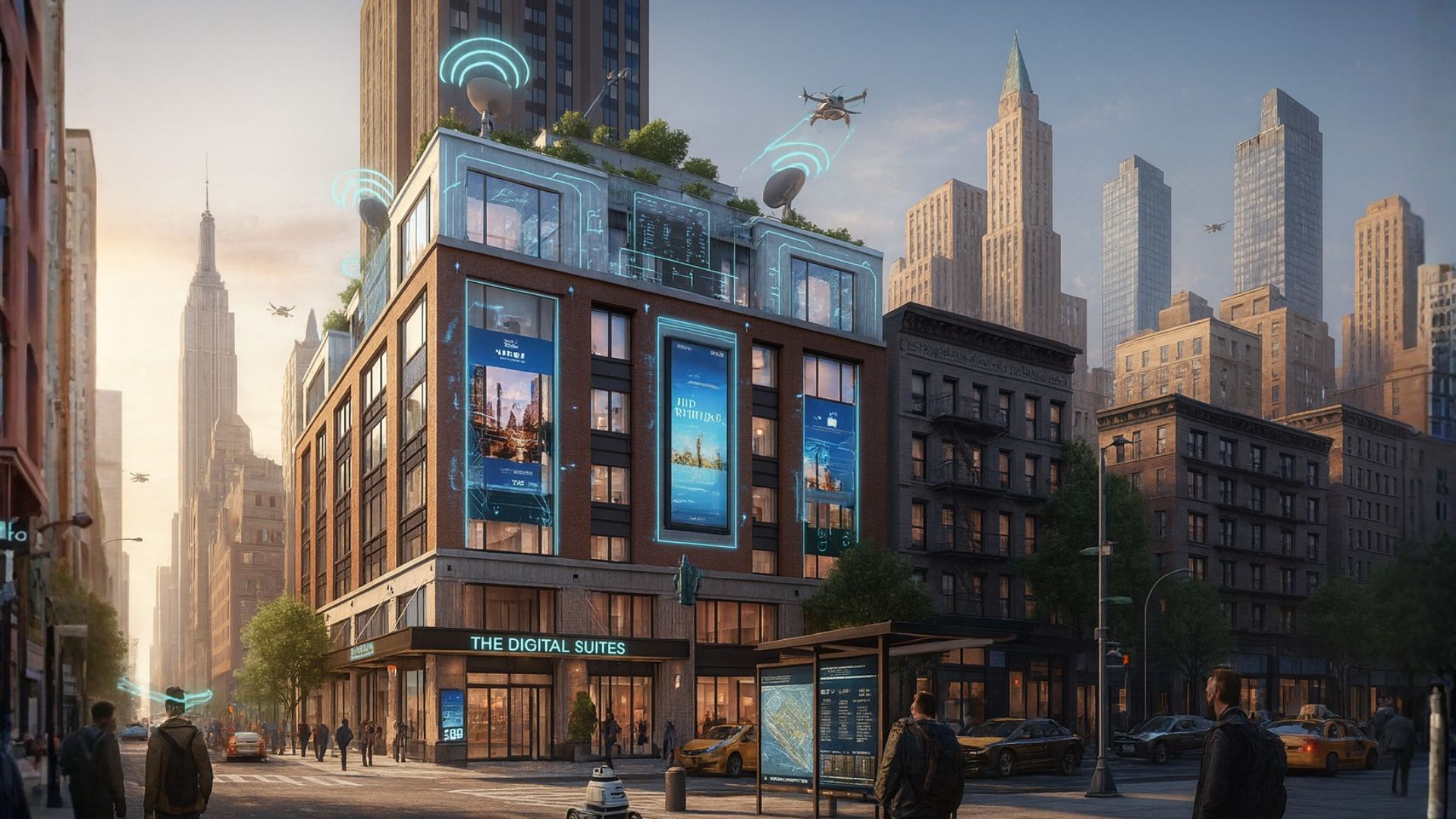ในยุคที่การแข่งขันของธุรกิจโรงแรมทั่วโลกทวีความรุนแรงขึ้น ประกอบกับต้นทุนทั้งค่าแรง สาธารณูปโภค และราคาพลังงานที่พุ่งสูงขึ้นอย่างต่อเนื่อง การเป็น "อสังหาริมทรัพย์ที่พร้อมรองรับ AI" จึงไม่ใช่เพียงแค่ทางเลือกด้านเทคโนโลยีอีกต่อไป แต่ได้กลายมาเป็นการลงทุนโครงสร้างพื้นฐานหลักที่ส่งผลโดยตรงต่อการกำหนดมูลค่าทรัพย์สินของโรงแรมในอีก 10–15 ปีข้างหน้า
และนี่คือเหตุผลสำคัญที่บ่งชี้ว่า ทำไมการวางแผนเรื่อง AI เตรียมไว้ตั้งแต่ขั้นตอนการออกแบบและก่อสร้าง จึงสร้างผลตอบแทนทางการเงินที่คุ้มค่าในระยะยาวให้กับเจ้าของโรงแรม
1. ลดต้นทุนการก่อสร้างได้อย่างมีนัยสำคัญ ด้วยสถาปัตยกรรมคลาวด์และการลดความซับซ้อนของระบบไฟฟ้าแรงดันต่ำ (Low-Voltage)
ระบบ IT ของโรงแรมยุคใหม่กำลังเปลี่ยนผ่านไปสู่ระบบคลาวด์อย่างรวดเร็ว การเปลี่ยนแปลงนี้ช่วยลดต้นทุนทั้งการก่อสร้างและการปรับปรุงระบบในระยะยาวได้ถึงรากฐาน
ลดขนาดหรือตัดห้อง Server Room ออกไปได้
ทำให้ลดงบประมาณในการจัดซื้อฮาร์ดแวร์ ลดภาระของระบบทำความเย็น และลดค่าเสื่อมราคาของอุปกรณ์ลงได้
ลดจำนวนสวิตช์ฝังผนังและลดการเดินสายสัญญาณแบบเก่า
โดยปกติแล้ว สวิตช์หรือเต้ารับแบบดั้งเดิมมักต้องถูกรื้อเปลี่ยนใหม่ทุก ๆ 5–7 ปี ตามเทคโนโลยีที่เปลี่ยนไป เช่น การเปลี่ยนจากพอร์ต USB-A เป็น USB-C
สถาปัตยกรรมเครือข่ายและการสื่อสารมีความยืดหยุ่นสูง
การอัปเกรดเทคโนโลยีในอนาคตทำได้โดยไม่ต้องรื้อเดินสายใหม่หรือทุบกำแพง ซึ่งช่วยลดรายจ่ายเพื่อการลงทุน (CapEx) ได้มหาศาล
การเตรียมสภาพแวดล้อมอาคารให้เป็น AI-Ready จะช่วยให้เจ้าของโรงแรมประหยัดงบประมาณก่อสร้าง ทำให้โครงการเสร็จรวดเร็วยิ่งขึ้น และหลีกเลี่ยงค่าใช้จ่ายอันสิ้นเปลืองจากการรื้อถอนปรับปรุงในอนาคต
2. ระบบบริหารจัดการพลังงานอัจฉริยะ คือการลดต้นทุนการดำเนินงาน (Opex) ในระยะยา
ระบบจัดการพลังงานภายในห้องพักที่ขับเคลื่อนด้วย AI สามารถสร้างผลลัพธ์การประหยัดพลังงานที่ชัดเจน คาดการณ์ได้ และมีความยั่งยืน
การบริหารระบบปรับอากาศ (HVAC) อัจฉริยะ
ช่วยประหยัดพลังงานได้ประมาณ 10–25%
การควบคุมระบบแสงสว่างและไฟฟ้าจากระยะไกล
ลดการใช้ไฟฟ้าสิ้นเปลืองในกรณีห้องว่าง หรือการเปิดทิ้งไว้ในช่วงเวลากลางคืน
การปรับปรุงการใช้น้ำร้อนและแก๊สให้เหมาะสม
เน้นประสิทธิภาพในช่วงที่มีการใช้งานพร้อมกันสูง
เม็ดเงินที่ประหยัดได้เหล่านี้จะส่งผลบวกโดยตรงต่อกำไรจากการดำเนินงานสุทธิ (NOI) ซึ่งท้ายที่สุดจะเป็นตัวทวีมูลค่าทรัพย์สินโดยรวมของโรงแรมให้สูงขึ้น
3. AI คือตัวคูณประสิทธิภาพการดำเนินงาน แต่ต้องเริ่มเตรียมความพร้อมตั้งแต่ช่วงก่อสร้าง
โมเดลการบริหารจัดการโรงแรมในอนาคตจำเป็นต้องพึ่งพา AI และระบบอัตโนมัติเป็นหัวใจหลัก
- การมอบหมายงานอัตโนมัติ: แจ้งเตือนปัญหาในห้องพักไปยังแผนกที่เกี่ยวข้องทันทีโดยไม่ต้องผ่านคนกลาง
- งานบริการแผนกต้อนรับแบบกึ่งอัตโนมัติ: เช่น ระบบผู้ช่วยสั่งงานด้วยเสียง (Voice Assistant) หรือ AI Call Center ที่ช่วยรับสายผู้เข้าพัก
- การบริหารจัดการกำลังคนและวัตถุดิบ: ใช้ AI คาดการณ์จำนวนพนักงานที่เหมาะสม และยอดขายอาหารและเครื่องดื่มได้แม่นยำ
- การซ่อมบำรุงเชิงป้องกัน: แจ้งเตือนก่อนอุปกรณ์เสีย เพื่อลดเวลาที่ห้องพักใช้งานไม่ได้
- ประสบการณ์ผู้เข้าพักที่เหนือกว่า: ด้วย AI Concierge และระบบสั่งการด้วยเสียงภายในห้องพัก
อย่างไรก็ตาม หากไม่ได้เตรียมพร้อมตั้งแต่เนิ่น ๆ เช่น จุดกระจายสัญญาณอินเทอร์เน็ตไม่ครอบคลุม ระบบไฟฟ้าไม่รองรับแฟลตฟอร์มรุ่นใหม่ ระบบหลังบ้านไม่ใช่คลาวด์ หรือโครงสร้างเครือค่ายในห้องพักไม่เสถียร ก็จะทำให้การติดตั้ง AI ในภายหลังทำได้ยุ่งยากและซับซ้อน หรืออาจทำไม่ได้เลย
ดังนั้น การออกแบบโรงแรมให้เป็น AI-Ready จะช่วยการันตีว่าโรงแรมของคุณจะสามารถเลือกใช้เครื่องมือ AI ใหม่ ๆ ในอนาคตได้อย่างยืดหยุ่น โดยไม่ติดข้อจำกัดด้านฮาร์ดแวร์
4. ผลกระทบโดยตรงของอสังหาริมทรัพย์ AI-Ready ต่อมูลค่าทรัพย์สินในระยะยาว
ประสิทธิภาพการดำเนินงานเพิ่มขึ้น ประหยัดพลังงานมากขึ้น และการใช้ระบบอัตโนมัติ คือปัจจัยสำคัญที่ช่วยขับเคลื่อนตัวเลขทางการเงินเหล่านี้
- รายได้จากการดำเนินงานสุทธิ (NOI) สูงขึ้น
- ค่าใช้จ่ายในการดำเนินงาน (Opex) ลดลง
- กำไรก่อนหักดอกเบี้ย ภาษี ค่าเสื่อมราคา และค่าตัดจำหน่าย (EBITDA) เติบโตขึ้น
- ความพึงพอใจของลูกค้าเพิ่มมากขึ้น
ตัวอย่างการเพิ่มขึ้นของ EBITDA ที่วัดผลได้จริง อ้างอิงจากเกณฑ์มาตรฐานของอุตสาหกรรม หรือ Industry Benchmarks
ระบบต้อนรับและบริการลูกค้าอัตโนมัติ
ลดภาระค่าแรงกะดึก หรือเจ้าหน้าที่รับสายโทรศัพท์ และช่วยเพิ่ม EBITDA ได้ประมาณ 150 – 250 ดอลลาร์สหรัฐ ต่อห้อง/ต่อปี
ปฏิบัติการวิศวกรรมอัจฉริยะ (การซ่อมบำรุงเชิงป้องกัน)
ลดปัญหาระบบล่ม ยืดอายุการใช้งานอุปกรณ์ และลดค่าใช้จ่ายในการซ่อมบำรุงลง 5–12%
ระบบอัตโนมัติสำหรับงานแม่บ้านและวิศวกรรม
เพิ่มประสิทธิภาพการทำงานของบุคลากรได้ 10–20%
การประหยัดพลังงานจากระบบ HVAC และระบบแสงสว่าง
ลดต้นทุนพลังงานต่อห้องลง 8–15% ส่งผลบวกต่อตัวเลข EBITDA โดยตรง
หากประเมินต่ำไว้ก่อนโดยอ้างอิงจากความเป็นจริง
ประสิทธิภาพในสถานการณ์จริงมักจะทำได้ประมาณ 50% ของศักยภาพสูงสุดที่คาดการณ์ไว้ สำหรับโรงแรมทั่วไป EBITDA อาจเติบโตประมาณ 5–12% ต่อปีเมื่อประเมินแบบ Conservative หรือประเมินต่ำ เพื่อไม่ให้เป็นการคาดการณ์ที่เกินจริง
ตัวอย่าง:
โรงแรมขนาด 200 ห้องที่มีฐาน EBITDA เดิมอยู่ที่ 3 ล้านดอลลาร์สหรัฐ อาจมีส่วนต่างกำไรที่เพิ่มขึ้นที่ประมาณ 150,000 – 360,000 ดอลลาร์สหรัฐต่อปี
ผลลัพธ์ทางการเงินระดับนี้ ถือว่ามีนัยสำคัญอย่างยิ่งในมุมมองของการลงทุนและการประเมินมูลค่าทรัพย์สิน
5. AI-Ready กลายเป็นบรรทัดฐานใหมสำหรับนักลงทุนโรงแรม
ตลาดทุนทั่วโลกกำลังแสดงให้เห็นถึงความแตกต่างของการให้มูลค่าสินทรัพย์อย่างชัดเจน
กลุ่มโรงแรมที่ติดตั้งระบบ AI และระบบอัตโนมัติ
ได้รับการประเมินมูลค่าสูงกว่าโรงแรมแบบดั้งเดิมถึง 1.5 – 2.0 เท่า
กลุ่มโรงแรมที่ขาดความพร้อมด้าน AI
มูลค่าทรัพย์สินหยุดนิ่ง ถูกผู้ซื้อกดราคามากขึ้นเรื่อย ๆ เนื่องจากผู้ซื้อประเมินแล้วว่าตนต้องแบกรับภาระต้นทุนในการอัปเกรดระบบเองในอนาคต
ดังนั้น ความสามารถในการแข่งขันและมูลค่าของโรงแรมในอนาคต จะถูกชี้วัดด้วย "ระดับความพร้อมด้าน AI" ของโรงแรมนั่นเอง






